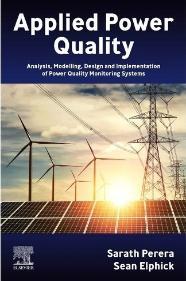May 24, 2023
Acclaimed APQRC Power Quality Researchers Unveil Definitive Book
Late last year, Sarath Perera and Sean Elphick, Honorary Professor and Research Coordinator at the Australian Power Quality Research Centre (APQRC), made a significant contribution to the field of Power Quality in Australia by publishing their comprehensive research book. Titled "Applied Power Quality: Analysis, Modelling, Design and Implementation of Power Quality Monitoring Systems," this book offers a systematic account of the evolving field of power quality, encompassing changes in generation, loads, management techniques, and advancements in monitoring devices and systems.
| Applied Power Quality | Purchase the book |
|---|---|
 |
Applied Power Quality, authored by Sarath Perera and Sean Elphick |
Sarath Perera, a former Technical Director of APQRC, has been a member of the academic staff at the University of Wollongong since 1988. He also holds the position of Chair in the Technical Committee on Power Quality (EL-034) of the Standards Australia Committee. Sean Elphick joined APQRC in 2003, providing valuable support through consulting and power quality research for the centre’s projects.
Together, Perera and Elphick have extensively examined the management of power quality, including emerging aspects such as system planning levels, emission allocation processes, and equipment immunity. Their work thoroughly reviews power quality disturbances and their effects on equipment. It offers thorough assessments of current power quality emission and allocation standards, covering various disturbances such as steady-state voltage, voltage unbalance, harmonics, voltage fluctuations, flicker and rapid voltage change, and voltage sags.
The authors also delve into the design and implementation of power quality monitoring schemes for readers. They discuss monitoring instruments, methodologies, data storage and analysis, indices, and reporting methods including benchmarking, and monitoring standards. The book concludes with surveys of the electrical performance of modern equipment, including renewable energy devices, as they relate to power quality. Throughout the publication, the authors draw upon reliable sources of power quality data, measurements, and studies, both in laboratory and field settings, conducted by the Australian Power Quality Research Centre over the past two decades.
Commenting on their achievement, Sean Elphick expressed his appreciation, stating, "it's great to bring the work of APQRC in the power quality space to the forefront. I would like to thank my colleagues at APQRC for their invaluable support." Sarath Perera acknowledged the inspiration he derived from APQRC, stating, "the centre has motivated me to delve into the fruitful subject of power quality." He also expressed tremendous admiration for his long-standing colleague, Sean Elphick, whom he describes as the "backbone of AQPRC."
This publication serves as a testament to APQRC's unwavering commitment to investigating and resolving power quality problems. It offers real-world case studies that demonstrate how to design robust systems and protect common electrical equipment from power quality issues. Additionally, the book explores the practical application of power quality standards to mitigate various phenomena, including high-frequency harmonics in renewable generators. It also addresses the impact of recent and forthcoming renewable energy conversion systems on power quality indices, while discussing the limitations and deficiencies of existing power quality standards.
To purchase a copy of the book or learn more about it, please see below. Congratulations to Sarath Perera and Sean Elphick on their remarkable achievement.
